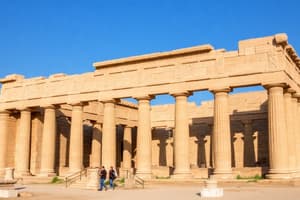Podcast
Questions and Answers
E.M. Forster argues that tolerance is vital for rebuilding the world. Which reason aligns with his argument?
E.M. Forster argues that tolerance is vital for rebuilding the world. Which reason aligns with his argument?
- Tolerance ensures everyone agrees on a single vision for the future, leading to efficient reconstruction.
- Tolerance eliminates conflict, as people readily accept each other's ideas, paving the way for rapid rebuilding.
- Tolerance encourages putting up with differences, which allows cooperation despite disagreements in rebuilding efforts. (correct)
- Tolerance allows experts to lead reconstruction unchallenged, as dissenting opinions are suppressed for efficiency.
In the context of Forster's essay, what is the primary limitation of love as a guiding principle for public affairs?
In the context of Forster's essay, what is the primary limitation of love as a guiding principle for public affairs?
- Love breeds contempt when not reciprocated, leading to societal divisions.
- Love is most effective in personal relationships but struggles to scale to broader societal contexts. (correct)
- Love is too rational and structured to address complex social issues effectively.
- Love is easily manipulated by political leaders to control the population.
According to Forster, what is the implication of viewing tolerance as a 'dull virtue'?
According to Forster, what is the implication of viewing tolerance as a 'dull virtue'?
- It implies tolerance is unexciting but necessary for societal function. (correct)
- It means tolerance is ineffective in promoting meaningful social change.
- It suggests tolerance is only valuable in specific, limited situations.
- It indicates tolerance should be replaced with more engaging virtues.
How does Forster use the concept of 'putting yourself in someone else's place' to promote tolerance?
How does Forster use the concept of 'putting yourself in someone else's place' to promote tolerance?
According to Forster, what is the critical difference between tolerance and weakness?
According to Forster, what is the critical difference between tolerance and weakness?
In Forster's view, how did Nazi Germany embody the opposite of tolerance?
In Forster's view, how did Nazi Germany embody the opposite of tolerance?
How does Forster suggest individuals can promote tolerance in everyday life?
How does Forster suggest individuals can promote tolerance in everyday life?
What rhetorical device does Forster use when he asks, 'Why will people be so slow?' or 'Why are they so deaf?'?
What rhetorical device does Forster use when he asks, 'Why will people be so slow?' or 'Why are they so deaf?'?
How does Forster employ allusions to religious texts in his argument for tolerance?
How does Forster employ allusions to religious texts in his argument for tolerance?
What is the role of a 'sound state of mind' in rebuilding civilization?
What is the role of a 'sound state of mind' in rebuilding civilization?
Which statement best reflects Forster's view on the relationship between individual behavior and broader societal reconstruction?
Which statement best reflects Forster's view on the relationship between individual behavior and broader societal reconstruction?
What evidence suggests that love has failed to bring stability to the world?
What evidence suggests that love has failed to bring stability to the world?
How does Forster contrast the potential effectiveness of architects and marketing boards with the 'proper spirit'?
How does Forster contrast the potential effectiveness of architects and marketing boards with the 'proper spirit'?
In Forster's analysis, what is the relationship between tolerance and imagination?
In Forster's analysis, what is the relationship between tolerance and imagination?
Which factor contributed to Forster's view that tolerance, rather than love, is imperative for societal mending after WWII?
Which factor contributed to Forster's view that tolerance, rather than love, is imperative for societal mending after WWII?
Flashcards
Who was E.M. Forster?
Who was E.M. Forster?
British novelist, essayist, and social critic who caricatured "public school behavior" in his novels.
Forster's view on tolerance
Forster's view on tolerance
Forster considers the goal of brotherly love in worldly affairs is unrealistic. Tolerance is the proper spirit for avoiding brutality and rebuilding the war-torn world of the 1940s.
Who cannot rebuild civilization?
Who cannot rebuild civilization?
Architects, contractors, international commissioners, marketing boards, broadcasting corporations will never build a new world themselves.
Love in public affairs
Love in public affairs
Signup and view all the flashcards
Forster's description of Tolerance
Forster's description of Tolerance
Signup and view all the flashcards
Tolerance in a crowded world
Tolerance in a crowded world
Signup and view all the flashcards
What does Tolerance Mean?
What does Tolerance Mean?
Signup and view all the flashcards
Therapy to cultivate tolerance
Therapy to cultivate tolerance
Signup and view all the flashcards
Love vs. Tolerance
Love vs. Tolerance
Signup and view all the flashcards
Needed to rebuild civilization
Needed to rebuild civilization
Signup and view all the flashcards
Where is Tolerance Needed?
Where is Tolerance Needed?
Signup and view all the flashcards
Alliteration
Alliteration
Signup and view all the flashcards
Asyndeton
Asyndeton
Signup and view all the flashcards
Parallelism
Parallelism
Signup and view all the flashcards
Why is repetition used?
Why is repetition used?
Signup and view all the flashcards
Study Notes
Author Biography
- E.M. Forster, born Edward Morgan Forster (January 1, 1879 – June 7, 1970), was a British novelist, essayist, and social and literary critic.
- He disliked Tonbridge School, which he attended, and satirized "public school behavior" in his novels.
- Forster found a more enjoyable atmosphere at King's College, Cambridge.
- He began writing short stories after graduating and resided in Italy, which served as the setting for his early novels Where Angels Fear to Tread (1905) and A Room with a View (1908).
- The Longest Journey (1907) is set in Cambridge.
- He lectured at Working Men's College in the year he returned to England.
- Howards End, his most mature work at the time, was published in 1910.
- In 1911, he traveled to India with G. Lowes Dickinson, his mentor at King's College.
- During World War I, Forster spent three years in Alexandria doing civilian war work, and after the war, he returned to London as a journalist.
- In 1921, he returned to India as secretary to the Maharajah of Dewas State Senior.
- He had begun work on A Passage to India earlier, but set it aside due to discouragement. It was published in 1924 after his return to England. It won the Femina Vie Heureuse and James Tait Black Memorial prizes in 1925 and is considered his magnum opus.
- In 1946, Forster became an honorary fellow at King's College, Cambridge.
- His essays and lectures on political topics established his reputation as a liberal thinker and advocate for democracy.
- Forster was awarded membership in the Order of Companions of Honor in 1953 and received the Order of Merit from Queen Elizabeth in 1969.
- He died in June 1970 after a series of strokes.
Background to the Essay: "On the Air"
- The essay was broadcast over the radio during and after World War II (1939–1945) and later appeared in Two Cheers for Democracy (1951).
- The means by which citizens of democracies can counter the spread of thinking that leads to brutal dictatorships is explored.
- Nazi Germany exemplified intolerance through its claims of racial superiority and mass murder of ethnic groups.
Tolerance E. M. Forster: "How ACCEPTING are you?"
- Forster reacts to the deadly ideological divisions by advocating for tolerance in this World War II-era essay.
- He suggests that brotherly love in worldly affairs is unrealistic, and tolerance is the "proper spirit" for avoiding brutality and rebuilding the war-torn world of the 1940s, because tolerance "is a very dull virtue".
Reconstruction
- Rebuilding the world after the war requires the right attitude.
- Civilization cannot be rebuilt by architects, contractors, or corporations alone, but requires inspiration
Love
- Forster argues that "love" is not the most important virtue needed in a post-war world.
- He believes love is a great force in private life but does not work in public affairs.
- He argues that nations and people should not love one another, as it's an absurd and dangerous idea.
Tolerance
- Tolerance is the virtue needed today for tolerance is the right attitude needed to rebuild the post-war world.
- The world must learn to put up with differences and tolerate each other.
Two solutions
- The author gives two solutions for the over crowded world:
- Nazi solution: "If you don't like people, kill them, banish them, segregate them…”
- The better solution: putting up with people.
Need of tolerance
- "Tolerance is wanted in the queue... it is wanted at the telephone, it is wanted in the street, in the office, at the factory, and it is wanted above all between classes, races, and nations..."
Conclusion
- Tolerance is not the same as weakness, "Putting up with people does not mean giving in to them".
Theme
- Tolerance means accepting others' views without malice and respecting diverse opinions.
- Tolerance allows for balance between different ways of life and promotes living harmoniously.
- The world has become a global village due to trade and transportation.
- Tolerance is essential to coexist in modern societies with diverse nations, races, and classes.
- Prejudice and bias should be avoided, people should be broad-minded and accept others' rights.
- Dogmatism and fundamentalism are destructive.
- Tolerance is the solution for peaceful coexistence.
- Tolerance has been historically lacking, leading to intrigues, conspiracies, murders, and wars.
- Flourishing the spirit of tolerance in people is the way to purge the human condition.
- Tolerance aligns with democracy and is advocated by almost all religions.
- The only way of creating a society or a civilized culture is tolerance.
- Forster cites a verse form the Bible to support his view! "In my father's house are many mansions.".
- People should put oneself in the place of others and analyze the situation.
- Understanding helps judge judiciously and tolerate conflicting opinions.
- Tolerance is more effective than love in public life.
- Forster urges to be open-minded.
Text Analysis: Why was the reconstruction needed?
- E.M. Forster wrote the essay after World War II, and depicted how the event destroyed society.
- Wars destroy not only lives and property but also ideals and ideological foundations.
- The Second World War destroyed everything and left behind chaos so the situation demanded that all people rebuild the civilization.
What was needed to rebuild the civilization?
- Civilization is complex and has its roots in different values and ideals.
- Second World War shook the moral, social and human bases of the world civilization too.
- A sound state of mind was needed.
- The tendency to tolerate others was the only solution in the post war world.
How should people live in post-war situation?
- People had to live with a different attitude.
- New parties, groups, and sentiments emerged after the war.
- It was important to tolerate each other in order for society to function.
- Cooperation will allow for people to live in peace
Literary Analysis: Persuasive Essay
- A persuasive essay is nonfiction that aims to persuade readers to adopt the writer's message, or central idea.
- Forster states his thesis as, "In public affairs, in the rebuilding of civilisation, something much less dramatic and emotional [than love] is needed, namely, tolerance".
- Rebuilding civilization requires "A sound state of mind".
Thesis Statement
- Thesis: a sound state of mind and proper spirit are needed for rebuilding civilization
Repetition
- "Yet this is the quality which will be most needed after the war. This is the sound state of mind which we are looking for. This is the only force which will enable different races and classes and interests to settle down together to the work of reconstruction.”
- Forster's repetition emphatically drives home his point that tolerance is a necessary state of mind for rebuilding after the war.
Using logic and language devices to persuade
- Love "gives out,” or stops working, love generally gives out as soon as we move away from our home.
- --What situation does Forster imagine in order to show when tolerance is needed?
- Tolerance is wanted in the queue, or "Why will people be so slow?", The tube "Why will people be so fat?” or the Street, the office, at the factory.
Literary Analysis: Alliteration
- It is the conspicuous repetition of identical initial consonant sounds in successive and closely associated syllables within a group of words such as “sound,” “state,” “spirit” “Portugal,” “Peru”.
Asyndeton
- Literary scheme in which one or several conjunctions are deliberately omitted from a series of related clauses: “kill them, banish them, segregate them"
Parallelism
- Grammar: a balance within one or more sentences of similar phrases or clause: “The idea that nations should love one another, or that business concerns or marketing boards should love one another or that a man in Portugal should love a man in Peru of whom he has never heard– it is absurd, unreal, dangerous."
Allusion
- “In my Father's house are many mansions" Heaven is a place of diversity. The quotation is from the New Testament of the Bible (John 14:2).
- “... and then strut up and down proclaiming that you are the salt of the earth.” The finest or noblest people. The expression derives from a statement in the New Testament of the Bible (Matthew 5:13).
Studying That Suits You
Use AI to generate personalized quizzes and flashcards to suit your learning preferences.





